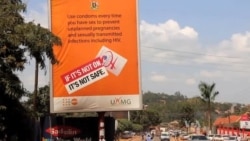Uganda had the third-highest number of new HIV infections in sub-Saharan Africa last year, behind South Africa and Nigeria, reversing its reputation for successfully tackling the epidemic in the 1990s. Although the percentage of people living with HIV/AIDS is half of what it was in the 1980s, the increase in new infections is worrying to health workers.
Health officials said one of the reasons for the rise in infections is that Uganda has become a victim of its own success, especially after the introduction of anti-retroviral drugs.
“I think what came in is complacency," said Henry Magala, program director of the AIDS Health Foundation. "People got satisfied that once you’re on medication, you’ll be all right. People began saying that HIV is like any other disease. So the fear to get it vanished.”
Uganda had received international praise for dropping its virus prevalence rate from 15 percent at its peak in 1991 to 7.3 percent today.
But the risk remains and is growing among people like Joyce, a 30-year-old woman who is living with HIV.
“I wanted to go to school," she said. "So this guy, he was dating me. So he decided to pay my school fees. So I think I became very reckless with my life and had [unprotected] sex with him. I think that’s where I got my HIV from. That’s what I remember.”
AIDS activists said people are not making use of the simplest way to protect against HIV: a condom.
“We see that 35 percent to 40 percent of people who should use condoms are not using them,” Magala said.
The Ugandan government is responding to the spike in new cases by creating an HIV-AIDS Trust Fund to finance a campaign against complacency.
“So we believe that as parliament, by creating this HIV and AIDS trust fund, we as Ugandans are going to contribute to this levy," said Sarah Kayagi Netalisire, a member of the parliamentary committee dealing with HIV and AIDS. "I believe it’s going to help us to reach out to those people we have may not reached out to.”
Funding has been an issue in recent years, leading to a shortage in HIV testing kits and other protective devices.
“We have continued to rely on donors for supplies of condoms in the country, so once this supply is short cut, that means the population has no condoms for protection,” Magala said.
Joyce, who's been living with HIV for five years, said hope is not lost for those with the virus.
“The best medicine for HIV is acceptance," she said. "The more you accept your status. the more you live.”





